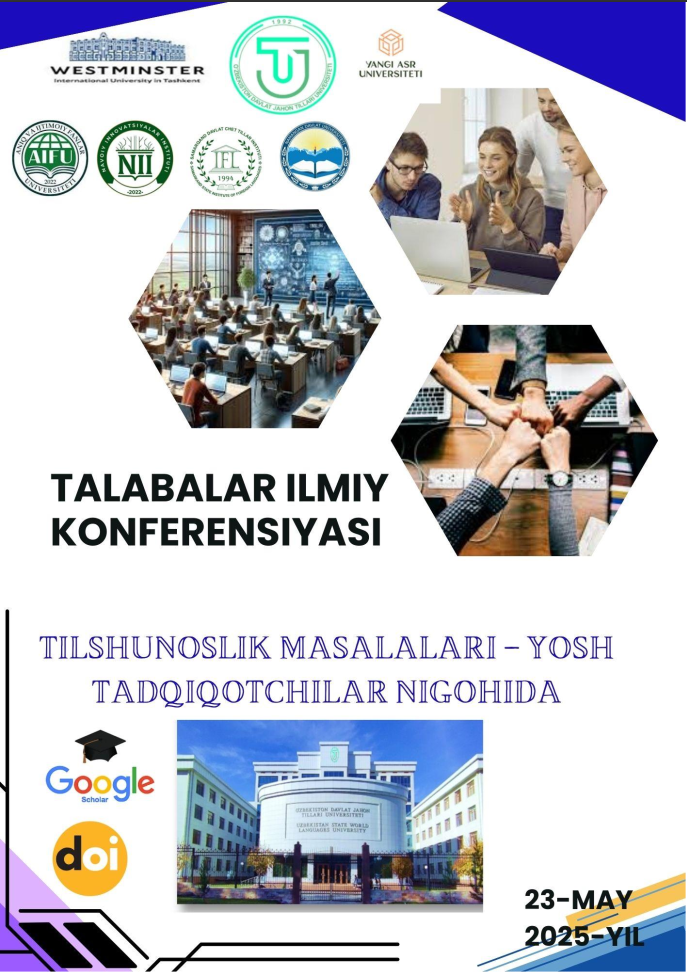THE EFFECTIVENESS OF VERBAL COMMUNICATION FOR DISPLAYING FEELINGS
https://doi.org/10.5281/zenodo.15517424
Kalit so‘zlar
Verbal communication, emotional expression, non-verbal signals, emotional intelligence, cross-cultural communication, emotional nuance, therapy, interpersonal relationships, empathy.Annotasiya
This article investigates how effective verbal communication serves as a mechanism for conveying human emotions. Although non-verbal signals, such as body language and facial expressions, are crucial, verbal communication provides clarity, depth, and intentionality in expressing feelings. The discussion includes how language enhances emotional expression, influences relationship dynamics, varies across cultures, and plays a role in therapeutic practices. The piece also addresses limitations such as miscommunication and barriers posed by emotional language. Ultimately, the article asserts that when verbal communication is paired with non-verbal elements, it becomes a powerful tool for emotional expression and connection.
Foydalanilgan adabiyotlar ro‘yhati
Barrett, L. F. (2017). How Emotions Are Made: The Secret Life of the Brain. Houghton Mifflin Harcourt.
Burgoon, J. K., Guerrero, L. K., & Floyd, K. (2016). Nonverbal Communication. Routledge.
Rogers, C. R. (1961). On Becoming a Person: A Therapist's View of Psychotherapy. Houghton Mifflin.
Mehrabian, A. (1972). Nonverbal Communication. Aldine-Atherton.
Knapp, M. L., & Hall, J. A. (2013). Nonverbal Communication in Human Interaction. Cengage Learning.
Abulkasimovna, E. Z., & Leonidovna, M. N. (2023, March). THE LEXICAL-SEMANTICAL USAGE OF PROFESSIONAL LEXEMES IN “UTGAN KUNLAR”(" PAST DAYS") BY ABDULLA QADIRI. In International Scientific and Current Research Conferences (pp. 20-22)
Alimdjanovna, K. M. (2023). Methods of teaching English and other foreign languages. International Journal of Pedagogics, 3(05), 99-102.
Ashirova, X., & Mamatkulova, F. (2024). Applying different teaching methods for enhancing the reading skills of elementary learners. O ‘zbekiston davlat jahon tillari universiteti konferensiyalari, 155-160.
Erdanova, Z. (2019). Onomastic is a mirror culture. In Science and practice: a new level of integration in the modern world (pp. 149-152).
Eshonqulov, J., & Sultonova, M. (2025). DIGITAL MEDIA AND COPYRIGHT: LEGAL DISPUTES AND AGREEMENTS. International Journal of Artificial Intelligence, 1(2), 1149-1154.
Kupaysinovna, S. G. (2022). LINGUISTIC AND SOCIAL HIGHLIGHTS OF THE CONCEPT OF “FAMILY” WITHIN THE ENGLISH AND UZBEK DIALECTS. BARQARORLIK VA YETAKCHI TADQIQOTLAR ONLAYN ILMIY JURNALI, 418-420.
Rashidova, G., & Fariza, N. (2024). THE RELATIONSHIP BETWEEN LANGUAGE AND CULTURE. TANQIDIY NAZAR, TAHLILIY TAFAKKUR VA INNOVATSION G ‘OYALAR, 1(3), 93-95.
Rashidova, G., & Munira, I. (2025). THE IMPACT OF TECHNOLOGY ON LANGUAGE DEVELOPMENT. TANQIDIY NAZAR, TAHLILIY TAFAKKUR VA INNOVATSION G ‘OYALAR, 1(4), 151-154.
SULTONOVA, M. (2024). On the issue of critical thinking.
Алимова, Д. К. К. (2020). Эффективность системы управления обучением; Moodle в процессе изучения языка. Вестник науки и образования, (12-2 (90)), 67-69.
Мухташамова, П. З. (2020). Характеристика грамматических навыков в различных видах речевой деятельности. Вестник науки и образования, (12-2 (90)), 86-88.

